14 start with O start with O
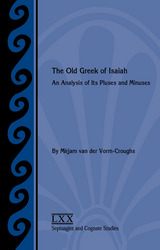
A concise study of a large number of examples of pluses and minus providing insight into translation from Hebrew to Greek
Van der Vorm-Croughs focuses this translation study on the processes leading to pluses and minuses including linguistic and stylistic aspects (i.e., cases in which elements have been added or omitted for the sake of a proper use of the Greek language), literary aspects (additions and omissions meant to embellish the Greek text), translation technical aspects (e.g., the avoidance of redundancy), and contextual and intertextual exegesis and harmonization. This work also covers the relation between the Greek Isaiah and its possible Hebrew Vorlage to try to determine which pluses and minuses may have been the result of the translator’s use of a different Hebrew text.
Features:
- Eleven categories for the pluses and minuses of the Greek Isaiah
- Examination of translation techniques and translator errors
- Use of Joseph Ziegler’s critical edition
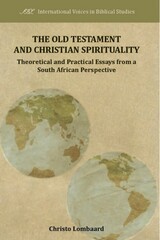
An engaging anthology that deals with both theory and practice
The emerging discipline of biblical spirituality considers how faith finds expression within the biblical texts and how modern expressions of faith interact with those texts. This volume represents Christo Lombaard’s reflective, analytical, and exegetical contributions to the field in order to explore how biblical texts mediate faith, both ancient and contemporary. It reflects on aspects of the interaction of faith and Scripture, critically approaching both dimensions.
Features:
- Seven previously published papers drawn predominately from South African journals
- Explorations of how biblical texts mediate faith
- Close examination of the discipline of biblical spirituality as part of spirituality studies

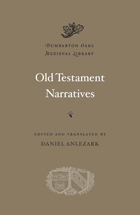
The Old English poems in this volume are among the first retellings of scriptural texts in a European vernacular. More than simple translations, they recast the familiar plots in daringly imaginative ways, from Satan's seductive pride (anticipating Milton), to a sympathetic yet tragic Eve, to Moses as a headstrong Germanic warrior-king, to the lyrical nature poetry in Azarias.
Whether or not the legendary Caedmon authored any of the poems in this volume, they represent traditional verse in all its vigor. Three of them survive as sequential epics in a manuscript in the Bodleian Library at Oxford. The first, the Old English Genesis, recounts biblical history from creation and the apocryphal fall of the angels to the sacrifice of Isaac; Abraham emerges as the central figure struggling through exile toward a lasting covenant with God. The second, Exodus, follows Moses as he leads the Hebrew people out of Egyptian slavery and across the Red Sea. Both Abraham and Moses are transformed into martial heroes in the Anglo-Saxon mold. The last in the triad, Daniel, tells of the trials of the Jewish people in Babylonian exile up through Belshazzar's feast. Azarias, the final poem in this volume (found in an Exeter Cathedral manuscript), relates the apocryphal episode of the three youths in Nebuchadnezzar's furnace.
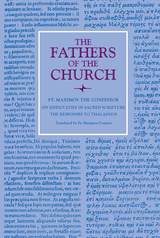
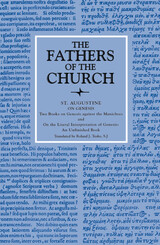
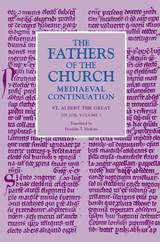
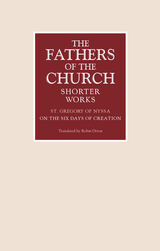
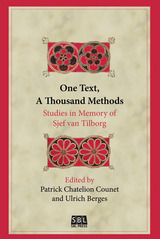
A Brill classic now in paperback from SBL Press
Essays in this volume describe the shift in biblical exegesis within the last several decades from the interpretation of biblical texts as the outcome of historical development, or diachronic methodology, to the exploration of the text as the result of a reading process rather than a historical process, or synchronic methodology. The methods discussed include ideology criticism, semantic and poetic analysis, cognitive linguistics, drama theory, narratology, deconstruction, and anthropology, and intertextuality. The authors of this work challenge biblical scholars not to just perform exegesis, but to explore the methods and aims underlying their interpretations.
Features:
- Essays examine texts from the Old or New Testament through the lens of one of the many modern synchronic methods used in postmodern literary interpretation
- Fifteen essays from top scholars in the field
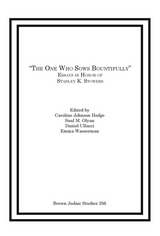
This festschrift honors the work of Stanley K. Stowers, a renowned specialist in the field of Pauline studies and early Christianity, on the occasion of his sixty-fifth birthday and retirement from Brown University. The collection includes twenty-eight essays on theory and history of interpretation, Israelite religion and ancient Judaism, the Greco-Roman world, and early Christinity, a preface honoring Stowers, and a select bibliography of his publications.
Contributors include: Adriana Destro, John T. Fitzgerald, John G. Gager, Caroline Johnson Hodge, Ross S. Kraemer, Saul M. Olyan, Mauro Pesce, Daniel Ullucci, Debra Scoggins Ballentine, William K. Gilders, David Konstan, Nathaniel B. Levtow, Jordan D. Rosenblum, Michael L. Satlow, Karen B. Stern, Emma Wasserman, Nathaniel DesRosiers, John S. Kloppenborg, Luther H. Martin, Arthur P. Urbano, L. Michael White, William Arnal, Pamela Eisenbaum, Troels Engberg-Pedersen, Karen L. King, Christopher R. Matthews, Erin Roberts, and Richard Wright.
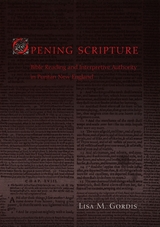
What role did the Bible really play in Puritan New England? Many have treated it as a blunt instrument used to cudgel dissenters into submission, but Lisa M. Gordis reveals instead that Puritan readings of the Bible showed great complexity and literary sophistication—so much complexity, in fact, that controversies over biblical interpretation threatened to tear Puritan society apart.
Drawing on Puritan preaching manuals and sermons as well as the texts of early religious controversies, Gordis argues that Puritan ministers did not expect to impose their views on their congregations. Instead they believed that interpretive consensus would emerge from the process of reading the Bible, with the Holy Spirit assisting readers to understand God's will. Treating the conflict over Roger Williams, the Antinomian Controversy, and the reluctant compromises of the Halfway Covenant as symptoms of a crisis that was as much literary as it was social or spiritual, Opening Scripture explores the profound consequences of Puritan negotiations over biblical interpretation for New England's literature and history.

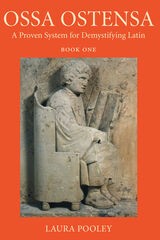

The book of Job is a complex, sophisticated treatment of the problem of undeserved suffering. It is also a sustained meditation on creation, on humanity’s place in creation, and on God’s ordering of creation. In this study, Kathryn Schifferdecker offers a close literary and theological reading of the book of Job—particularly of the speeches of God at the end of the book—in order to articulate its creation theology, which is particularly pertinent in our environmentally-conscious age.
After all of Job’s agonized questioning, God’s answer does not directly address Job’s questions about undeserved suffering or divine justice. Instead, the divine speeches take Job on a God’s-eye tour of creation in all its beauty and complexity. In extraordinarily detailed and beautiful poetry, the divine speeches show Job that the world is radically non-anthropocentric, that there exist wild places and animals whose value has nothing to do with their usefulness to humanity, and that God delights in the freedom of God’s creatures. This vision of the divine speeches enables Job to move out of despair into renewed participation in God’s often-dangerous but beautiful world.
This creation theology of Job, virtually unique in the Bible, has much to say to us today, as we struggle theologically and politically with the issues of environmental degradation and humanity’s relationship to the natural world.
READERS
Browse our collection.
PUBLISHERS
See BiblioVault's publisher services.
STUDENT SERVICES
Files for college accessibility offices.
UChicago Accessibility Resources
home | accessibility | search | about | contact us
BiblioVault ® 2001 - 2024
The University of Chicago Press









